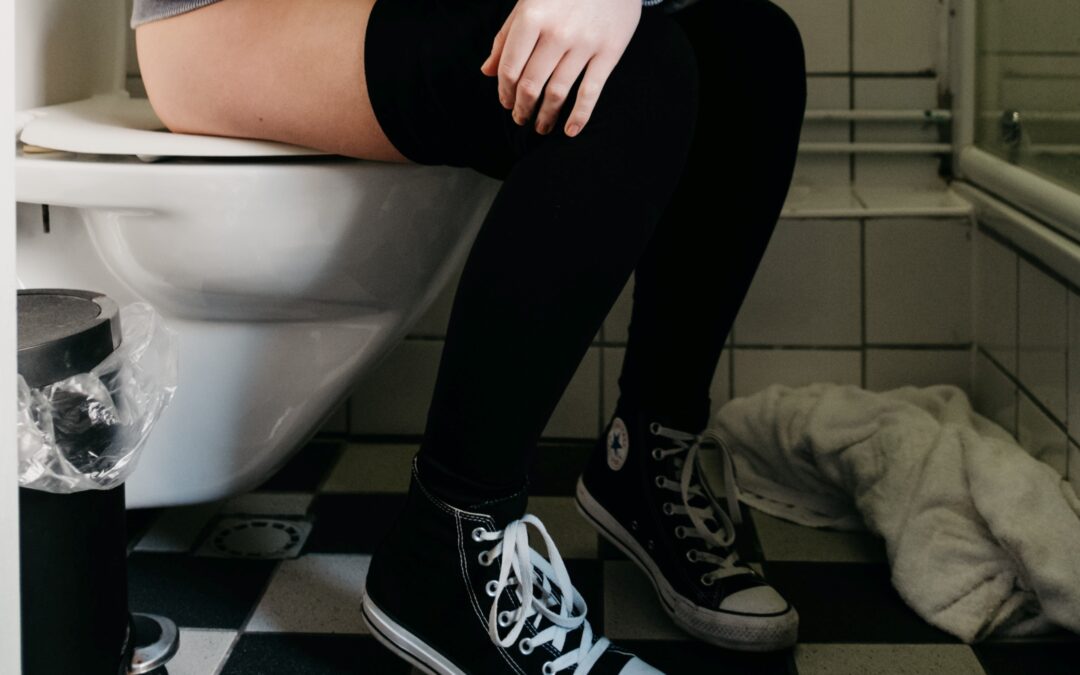One thing many of my client’s chart is bowel movements. Yep good old, pooping. It is common for women to notice their bowel habits change throughout their monthly menstrual cycle. This shift in pattern is because the bowel is affected by hormone changes throughout the month.
During each menstrual cycle, the body goes through many hormonal shifts. Many women already connect PMS symptoms to the menstrual cycle changes, including mood swings and cramps. But are you aware of how these hormonal fluctuations can also impact digestive changes?
These digestive disruptions can include constipation, diarrhea or more frequent bowel movements. With one study reporting, 73% of females experienced period-related gastrointestinal symptoms. More affectionately known as “period poop.”
So why the changes?
Increased progesterone
The week before your period progesterone increases. For some, this increase can lead to constipation or diarrhea. Progesterone can act as a muscle relaxant and slow down digestive function. This can be more prevalent for those with Irritable Bowel Disease (IBD) -related conditions.
Some research also showed people with IBD are more likely to experience other PMS symptoms, such as headaches or menstrual pain.
Increased Muscle Contractions
Some research says it could be the increase in muscle contractions, due to the release of prostaglandins, just before you get your period. These hormones stimulate muscle contractions in the uterus, which helps the body to shed the uterus lining.
At the same time, it is doing this in your body, the period hormones may stimulate muscle contractions in the intestines and bowels, which are close to the uterus, causing more frequent bowel movements. They also reduce how well the body absorbs water, making the stool softer and increasing the risk of diarrhea.
It can be difficult to tell the difference between uterus cramps and stomach or intestinal cramps at this time. Both may be uncomfortable or painful.
Dietary changes
Progesterone may increase feelings of hunger and can cause cravings for foods high in fat or sugar, such as ice cream or chocolate. The body has a hard time digesting these foods, and eating more of them can affect a person’s bowel movements.
PMS-related changes in dietary habits may contribute to why some people notice differences in the consistency, regularity, or smell of their stool before or during a period. It is really important you are looking at your diet here and how to can support your body in a healthy way.
Ensure you have a regular intake of water to about 2 litres.
Increased stress or anxiety
Many of us are already aware of the impact the menstrual cycle has on our mood just before we get our period. These changes in mood and anxiety levels can also impact our bowel movements, causing constipation or diarrhea.
According to research appearing in the journal BMC Women’s Health, people report greater sensitivity to pain and discomfort in the premenstrual phase as well as on their periods. So, if you have a lower pain threshold at this time, it is therefore common to experience higher pain.
Tips
Everyone is different and this is why charting is a really beneficial activity especially if you are experiencing this on a regular basis. Look at the diet and lifestyle change you could implement to reduce the risk or impact of constipation, or diarrhea.
The following tips may help people better manage period-related digestive disturbances:
- Ensure you are drinking enough water. Try to ensure you are having around 2 litres per day.
- Eat plenty of natural fibre, including fruits and veggies.
- Move your body, whether it’s a nice run, a boxing session (if you are feeling up for it), or a yoga session. Moving helps.
- Try using essential oils. There are some wonderful essential oils you can use to support your body when it comes to diarrhoea and constipation. I love using black pepper, sweet orange and peppermint, in a sweet almond base massage oil and massage clockwise over the tummy.
Charting can help you identify if this issue is coming up as a regular occurrence in a particular phase of your cycle. This allows you to really treat the condition from a holistic perspective. If period-related bowel disturbances get in the way of a person’s daily life, they can talk to their doctor about the best treatment options.
Period-related bowel changes can be unpleasant, but they usually end as the period ends. If pain persists make sure you seek medical advice from your GP, naturopath or other health professional.
image credit: mitchell-orr-vNfUDiPW6VE-unsplash

